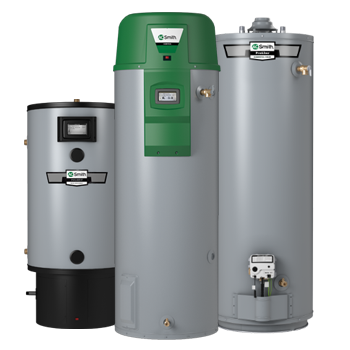
Residential Water Heater Options
By Nate Rogers, E.I.T.
We were recently involved with a plumbing design for a new apartment building with several design constrictions which created a challenge in selecting a water heater. In this building, each apartment needed to have an individual hot water system, had very minimal space, and was impractical to run gas piping to each apartment. This led us to dive deeper into current water heater technology and a comparison of the common types.
 Photo courtesy of A.O. Smith
Photo courtesy of A.O. Smith
Tank Type Water Heaters
Gas Tank Type Water Heaters
Gas tank water heaters burn either natural gas or liquid propane to heat water and stored in a highly-insulated tank. These tanks are cylindrical, usually 18” diameter, and typically range between 40 and 70 gallons capacity. A thermostat in the tank regulates the burner to reheat the water, as needed, to maintain the desired water temperature. Exhaust gases created during the heating process must be ducted to the outdoors.
Electric Tank Type Water Heaters
Electric tank water heaters only differ from gas tank water heaters in the heating method. Rather than a natural gas or liquid propane fired burner, these water heaters use electric heating elements. There is no need for ducting or gas piping.
Hybrid Heat Pump Water Heaters
Hybrid heat pump water heaters use two different heating technologies to heat water in their tank. The heat pump portion of these water heaters pulls in ambient air through an evaporator allowing heat from the surrounding air to be transferred to refrigerant. That same refrigerant is pumped through a compressor and then around the tank to heat the water. In cases where this heat pump cannot provide sufficient heating to the water alone, these units have standard electric heating elements to achieve the desired water temperature. This type of water heater is typically the most efficient option.
Tankless Water Heaters
Gas Tankless Water Heaters
Tankless water heaters (also known as on-demand water heaters) take up a very small amount of space compared to their tank counterparts. These units are attached right at the water line and usually consist of a wall-mounted cabinet. When a hot water tap is opened, the flow sensor in the cabinet turns on a high-powered gas burner which immediately begins to heat the water in the system. When the tap is turned off, the burner shuts down. Similar to gas tank type heaters, the exhaust gases created during the heating process must be ducted to the outdoors.
Electric Tankless Water Heaters
Electric tankless water heaters only differ from gas tankless water heaters in heating method. Just like the electric tank water heaters, these units use electric coils. However, due to the need to heat water very quickly, the electric demand of these units can be astronomical. Supplying a single sink with an electric tankless water heater may be a good solution in a renovation, but providing hot water to a whole house with this type of system will lead to a high electrical bill.
More Articles From...
| This Category | Engineered Consultations, Home Repairs, Residential Engineering |
| This Author | Nate Rogers, E.I.T. |
